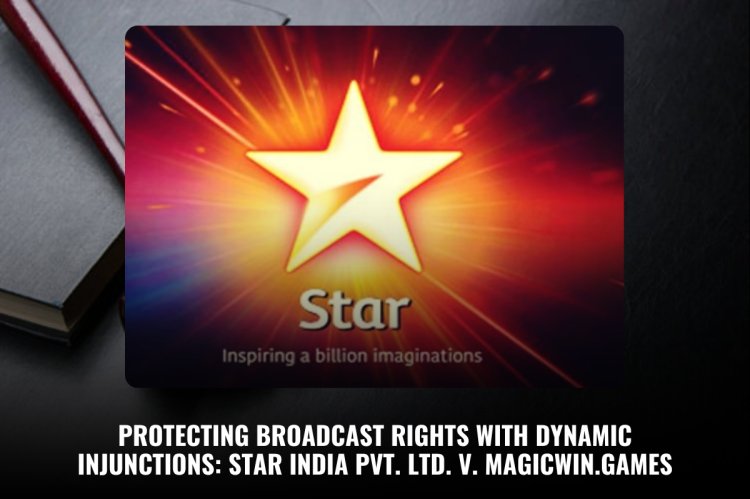"Protecting Broadcast Rights with Dynamic Injunctions: Key Insights from Star India Pvt. Ltd. v. Magicwin.Games"
Explore how the Delhi High Court safeguarded broadcast rights through dynamic injunctions in Star India Pvt. Ltd. v. Magicwin.Games—a landmark case shaping India’s digital IP enforcement landscape.

Introduction
With the rise of digital streaming, protecting broadcast rights has become a crucial challenge for content owners. The case of Star India Pvt. Ltd. v. Magicwin.Games marks a significant milestone in intellectual property rights (IPR) enforcement, specifically tackling unauthorized streaming through the use of dynamic injunctions. This legal tool has proven to be a powerful mechanism in combating online piracy, ensuring that copyright holders maintain control over their content in an ever-evolving digital landscape.
Understanding the Case
Background
Star India Pvt. Ltd. is a major broadcaster that holds exclusive streaming and broadcasting rights for various sporting events, including high-profile cricket tournaments. However, rogue websites such as Magicwin.Games were found to be illegally streaming these events, leading to substantial revenue losses for Star India.
To address this issue, Star India sought an injunction from the court, arguing that traditional legal remedies were insufficient. Since infringing websites frequently change their domains and URLs to evade legal actions, a static injunction would not effectively curb the piracy.
What is a Dynamic Injunction?
A dynamic injunction is an advanced form of legal protection that extends beyond a static injunction. It allows courts to block new infringing domains, URLs, and mirror websites as soon as they emerge, without requiring the copyright owner to file a new lawsuit each time.
Key Benefits of a Dynamic Injunction:
- Real-time Blocking: Courts can extend an injunction to new infringing domains without fresh legal proceedings.
- Proactive Action: ISPs and domain registrars are mandated to prevent the spread of pirated content.
- Efficient Enforcement: Copyright owners save time and resources by avoiding multiple lawsuits.
Landmark Precedent: UTV Software Communication Ltd. Case
The UTV Software Communication Ltd. v. 1337X.to & Ors. case was a groundbreaking ruling by the Delhi High Court that introduced dynamic injunctions in India. It established a strong legal framework to combat online piracy, allowing courts to effectively tackle rogue websites engaged in repeated copyright violations.
Legal Issues at Hand
1. Copyright Infringement
The primary legal question in Star India Pvt. Ltd. v. Magicwin.Games was whether unauthorized streaming of Star India’s content violated its broadcast reproduction rights under the Copyright Act, 1957. The court needed to determine the extent of liability for Magicwin.Games and other unidentified websites facilitating piracy.
2. Justification for a Dynamic Injunction
The court also had to decide whether a dynamic injunction was necessary. Given that rogue websites often change domain names to evade blocking orders, the plaintiff argued that a static injunction would be ineffective. The court assessed whether granting a dynamic injunction would provide a long-term solution to the problem.
3. Balance of Convenience & Irreparable Harm
Another critical factor was whether Star India would suffer irreparable harm if unauthorized streaming continued. The court had to weigh the potential losses faced by Star India against the public interest and the practicality of enforcement.
To know more about this you can follow the link below:
Court’s Ruling & Reasoning
Recognizing the dynamic nature of digital piracy, the court ruled in favor of Star India, citing the need for robust legal mechanisms to protect intellectual property rights in the digital space. The judgment referenced cases like Universal City Studios LLC v. Dotmovies.baby and reaffirmed the necessity of dynamic injunctions in combating piracy.
Key Court Directives:
- A dynamic injunction was granted, enabling Star India to request immediate blocking of newly identified infringing websites without initiating fresh litigation.
- Internet Service Providers (ISPs) and domain registrars were directed to implement the blocking orders swiftly.
- The ruling strengthened copyright enforcement by ensuring real-time monitoring of piracy-related activities.
Key Takeaways
1. Dynamic Injunctions are Crucial in Fighting Piracy
The judgment sets a strong precedent for the use of dynamic injunctions in India, ensuring that copyright holders have an effective legal remedy against constantly evolving piracy tactics.
2. Strengthening Broadcast Rights Protection
Broadcasters with exclusive content rights can now rely on dynamic injunctions to safeguard their intellectual property from unauthorized digital streaming.
3. ISP & Domain Registrar Compliance is Essential
The ruling reinforces the responsibility of ISPs and domain registrars in curbing online piracy, making them key enforcers in the protection of intellectual property rights.
Conclusion
The Star India Pvt. Ltd. v. Magicwin.Games case is a significant step forward in the fight against digital piracy. By allowing courts to grant dynamic injunctions, this ruling enhances the protection available to content owners, ensuring that unauthorized streaming can be tackled more effectively. As digital piracy continues to evolve, legal frameworks must keep pace to provide stronger safeguards for copyright holders, setting the stage for future legal developments in this domain.












